Main Menu
- EnvironmentHealth
Main Menu
- EnvironmentHealth
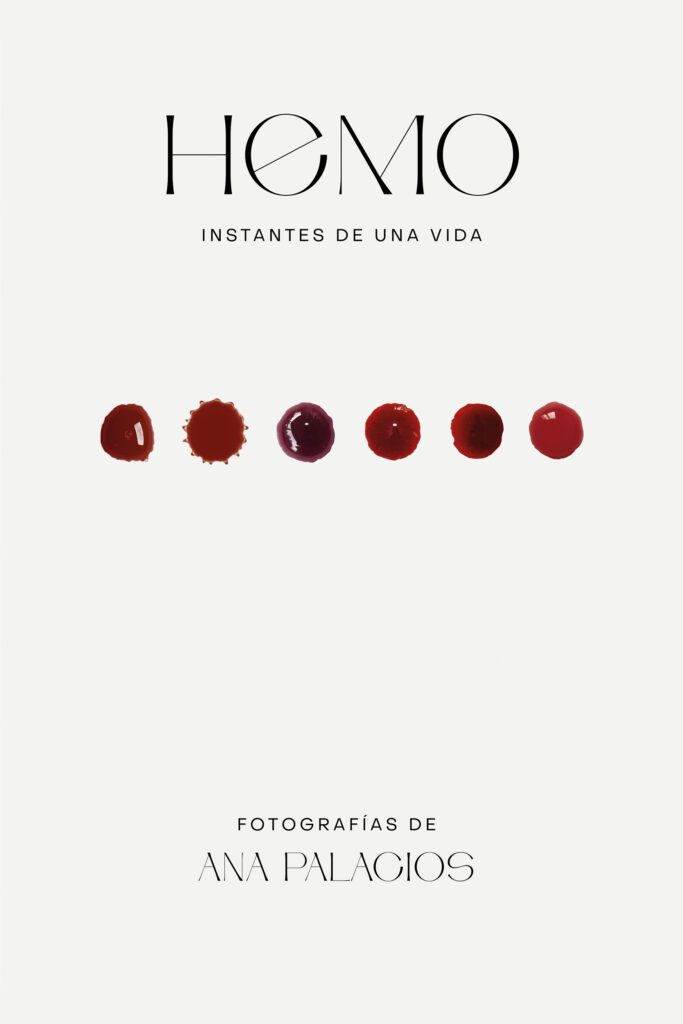
Hemo’ is a documentary project about hemophilia and its unknown consequences for those who suffer from it.
Did you know that a person with hemophilia has to inject medication every two days? Did you know that they suffer unbearable pain in their joints?
This work is the result of sharing long hours with Laura, Fabio, Julio, Paco, Iker and Raúl and their disease, with its lights and shadows.
* The project is supported by the NGOs Federación Española de Hemofilia, y de Levin Institutional Affairs.
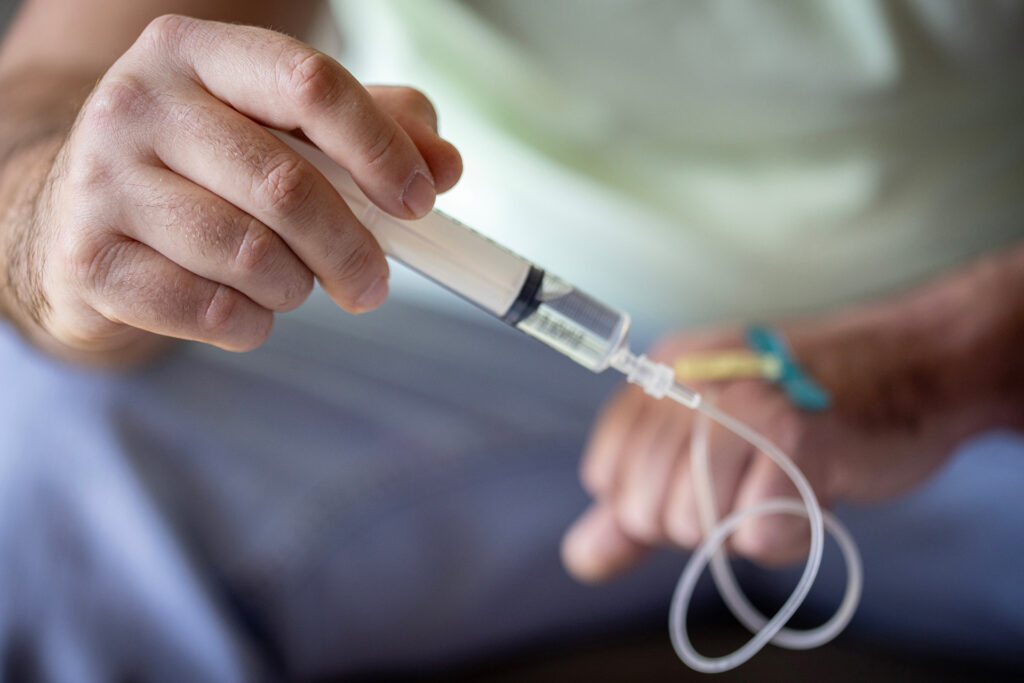
“I need medication in my daily life to live a more or less normal life. So it is important for me to live close to a hospital, to be able to have access to the health system to get all the medication and care I may need”.
Fabio Blasco. Hemophilia B. Severe.
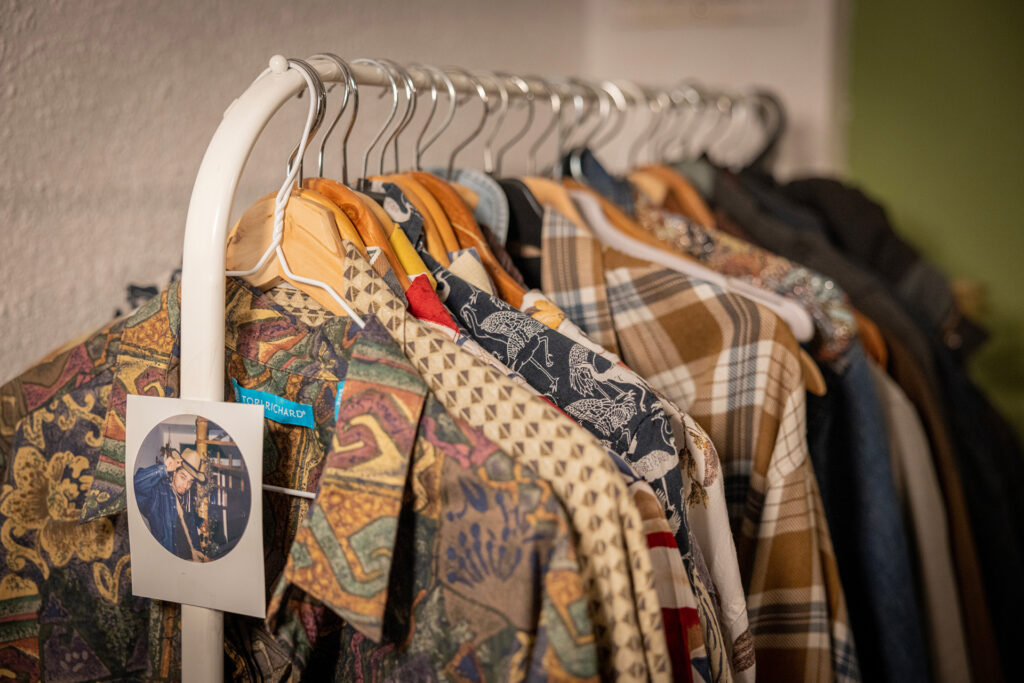
“Simple things like a cut, a wound or a dentist’s surgery can lead to hemorrhages for which I have to be hospitalized”.
Fabio Blasco. Hemophilia B. Severe.
Hemo’ project materials’
Photography and video
Ana Palacios
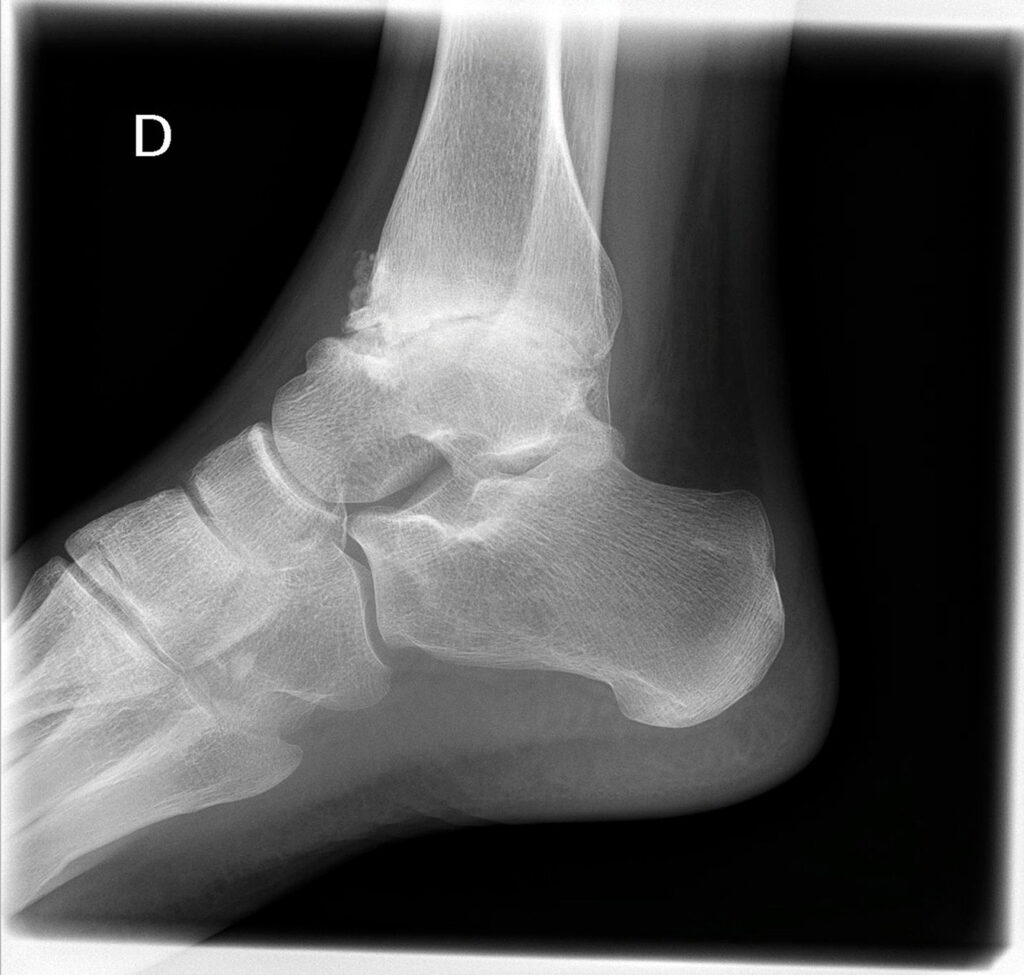
“At the beginning of my journey with hemophilia when I was almost 3 years old, lack of control and not knowing how to treat the disease led to bleeding, bruising and the joint problems I suffer from today.”
Fabio Blasco. Hemophilia B. Severe.
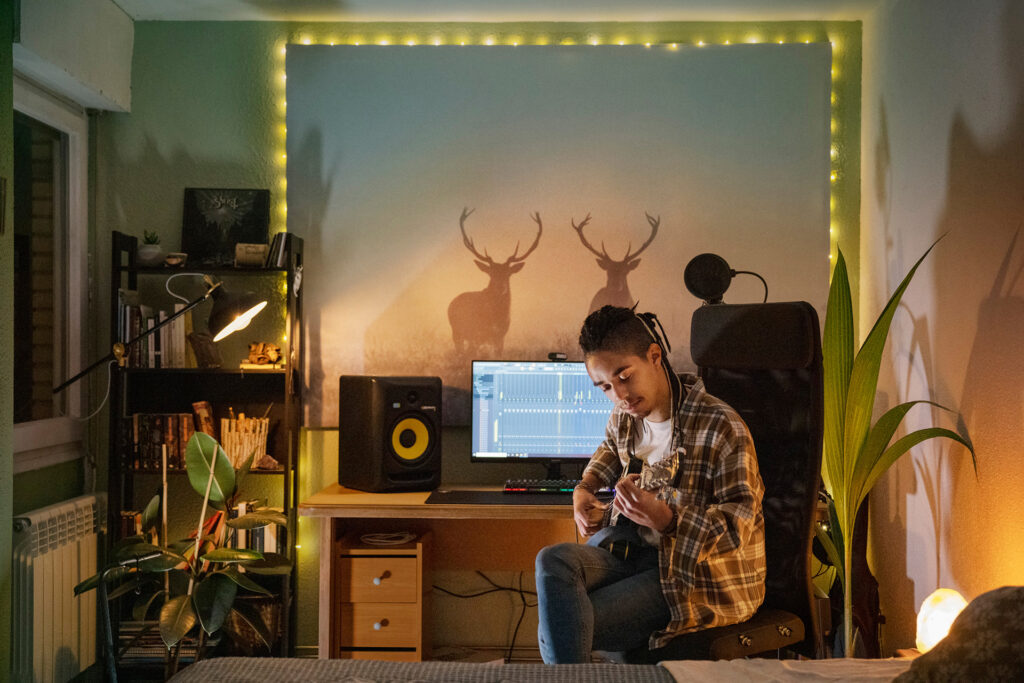
“Music is the best channel I have found to express my feelings. Those days when I can’t leave the house, or even weeks when I have had to be hospitalized or “confined” because of hemophilia with a lot of pain, music has been a way of escape and a way of personal exploration”.
Fabio Blasco. Hemophilia B. Severe.
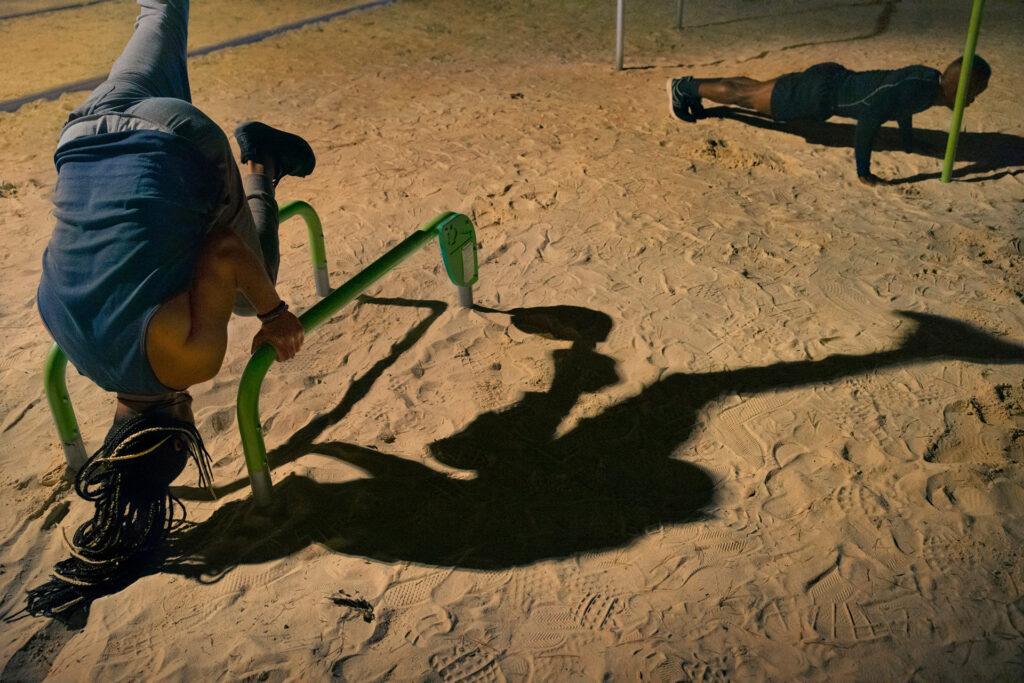
“Calisthenics is a sport that requires a lot of effort, balance and dexterity. The best part for me is that most of the time you are either hanging or in suspension and you hardly use your lower body, which is where I have the most difficulty”.
Fabio Blasco. Hemophilia B. Severe.
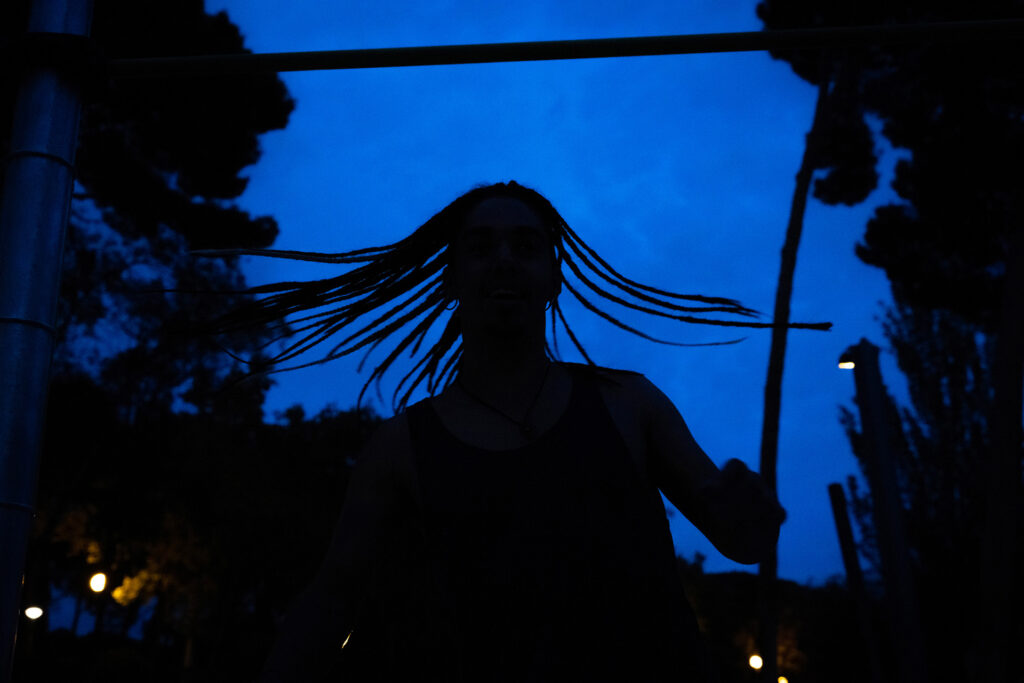
“Hemophilia is a life condition. It means that the decisions I have to make in my day-to-day life revolve around it.”
Fabio Blasco. Hemophilia B. Severe.
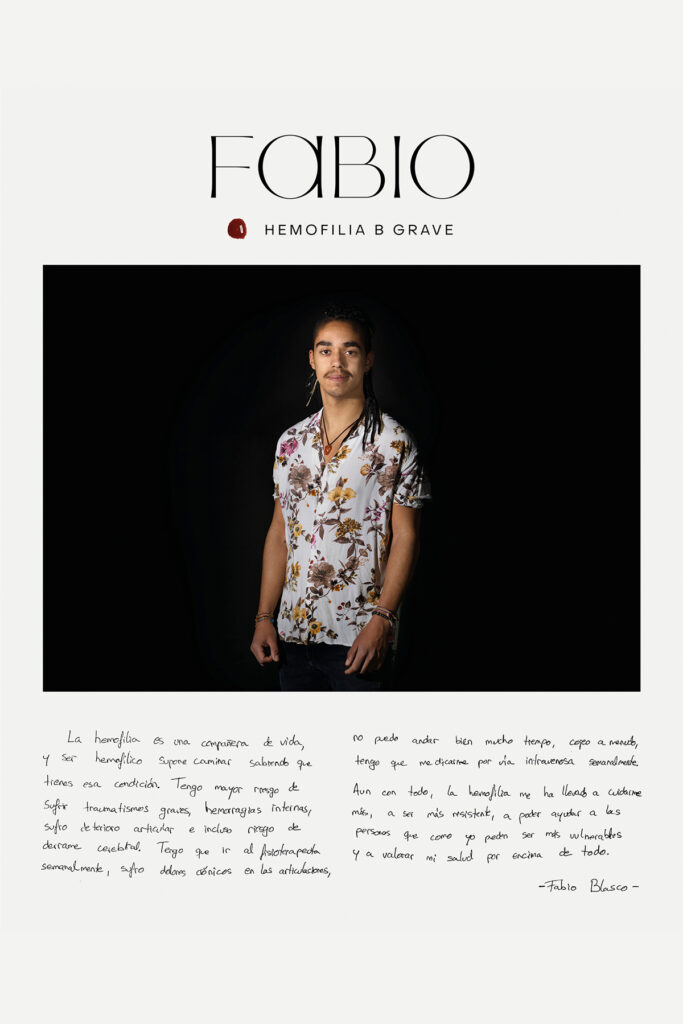
Even so, hemophilia has led me to take better care of myself, to be more resilient, to be able to help people like me who may be more vulnerable and to value my health above all else.”
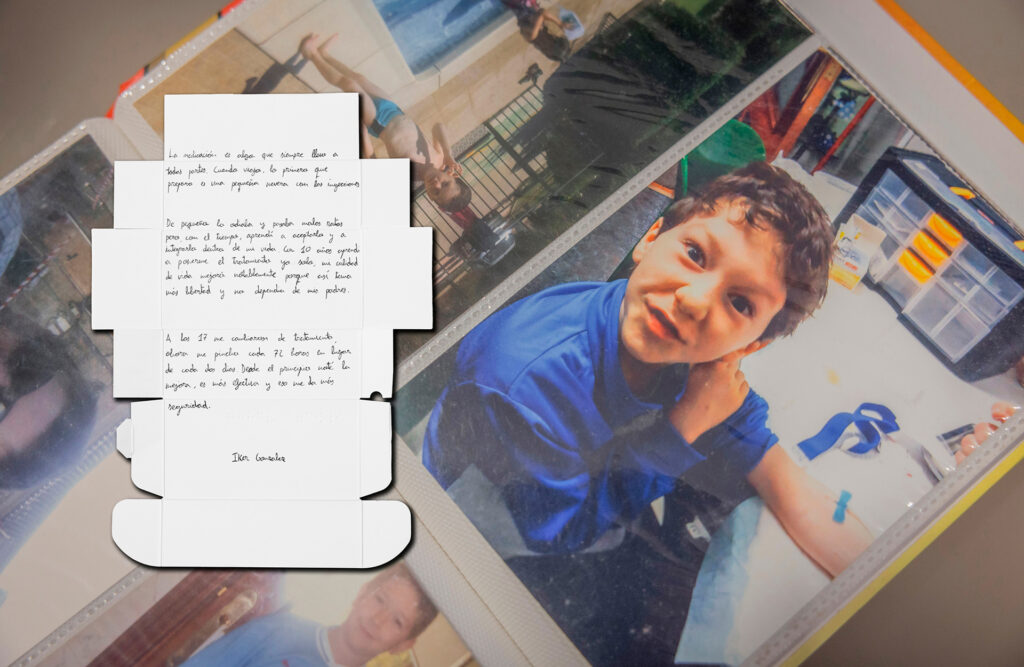
“When I was a child I hated it and had a hard time, but over time I learned to accept it and integrate it into my life. When I was 10 years old I learned to take the treatment myself, my quality of life improved significantly because I had more freedom and did not depend on my parents.”
Iker González. Hemophilia A. Severe.
Hemo’ project materials’
Photography and video
Ana Palacios
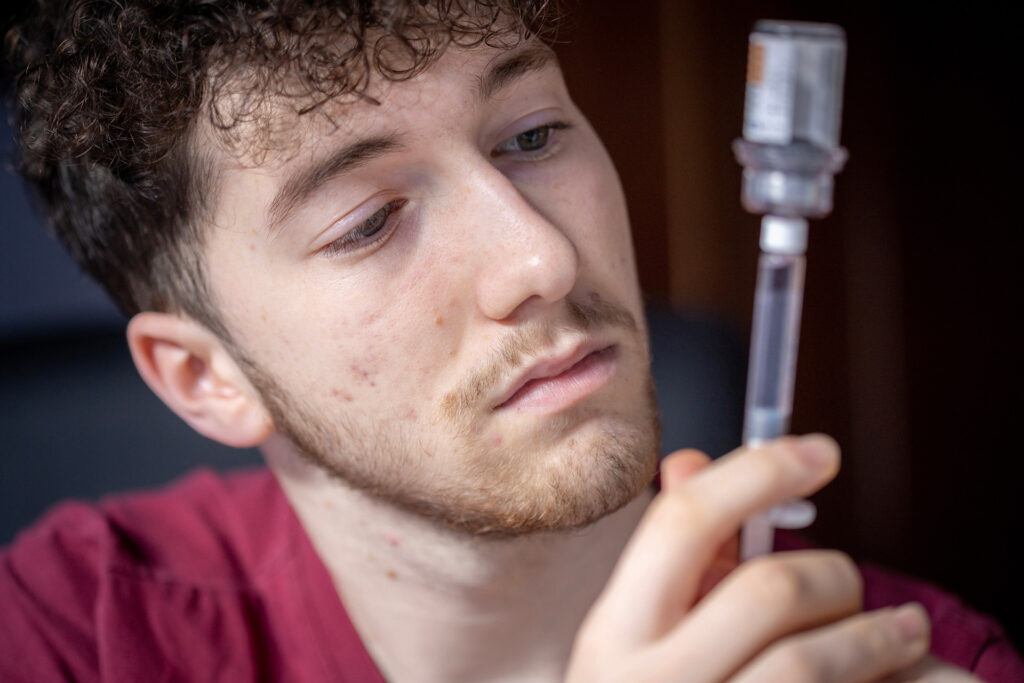
“When I was 17 years old, they changed my treatment, now I take the injection every 72 hours instead of every two days at home. From the beginning I noticed the improvement, it is more effective and that gives me more security.”
Iker González. Hemophilia A. Severe.
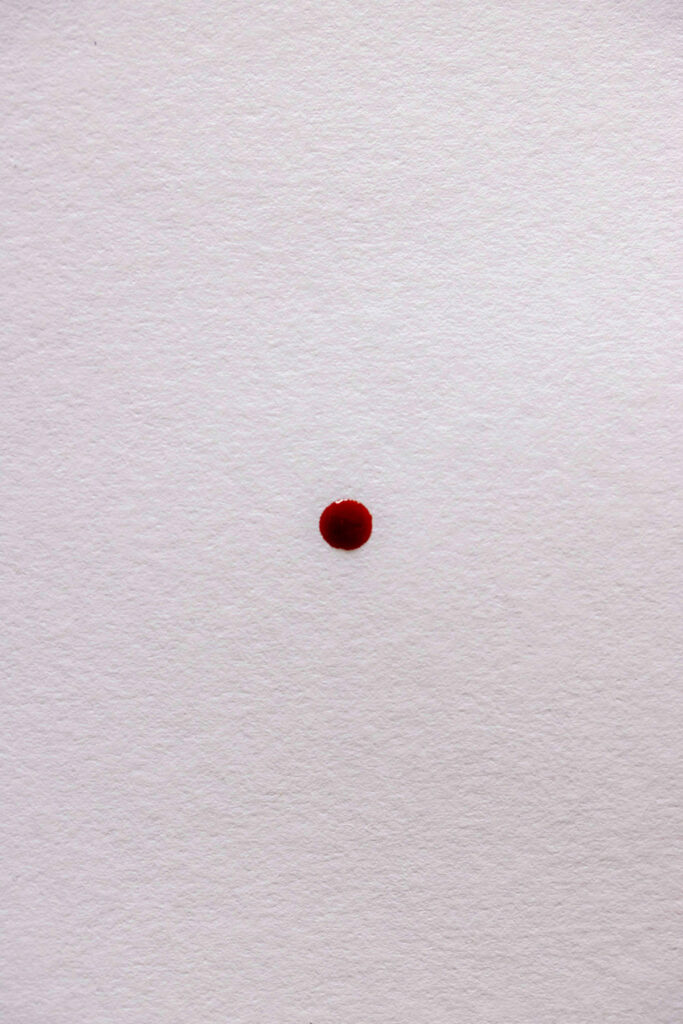
“Hemophilia is something I have accepted and I have always handled it very well. I have certain limitations, but they don’t interfere with my lifestyle. It is something I talk about normally to my friends, to my environment, to the partners I have had…”
Raúl Martínez. Hemophilia A. Severe.
Hemo’ project materials’.
Photography and video
Ana Palacios
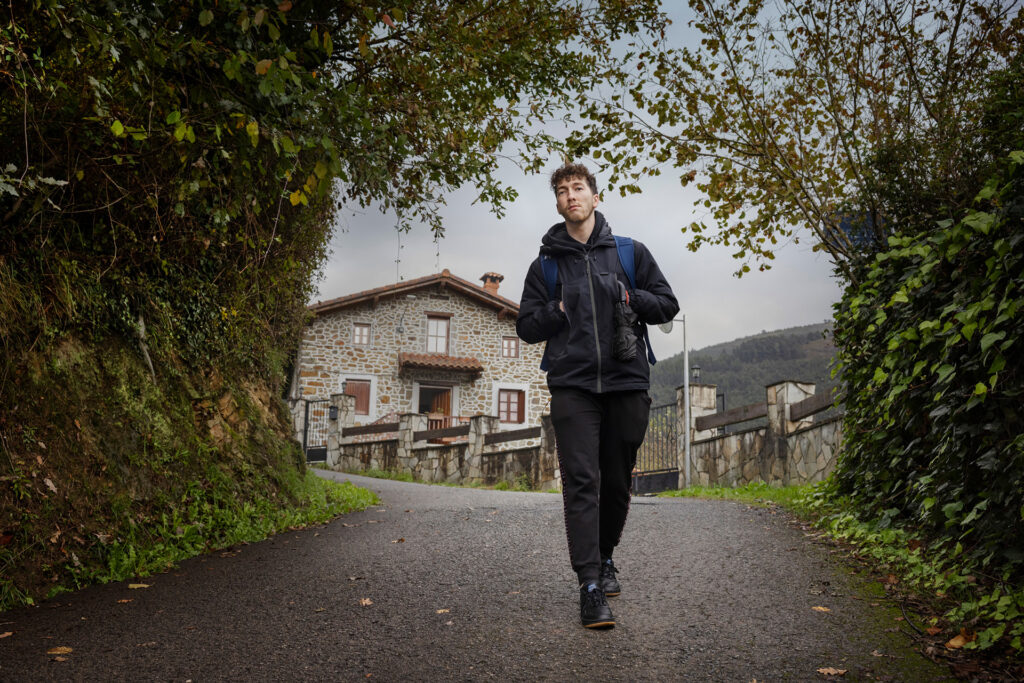
“We have a small txoco in the forest. It’s our family resting place. We go there a lot on weekends to spend the day. We have barbecues, and we end up playing cards all afternoon. We have a vegetable garden, chickens, rabbits…
Walking in the forest gives me a lot of peace of mind. Nature connects me with the importance of taking care of my health and makes me more aware of my illness.”
Iker González. Hemophilia A. Severe.
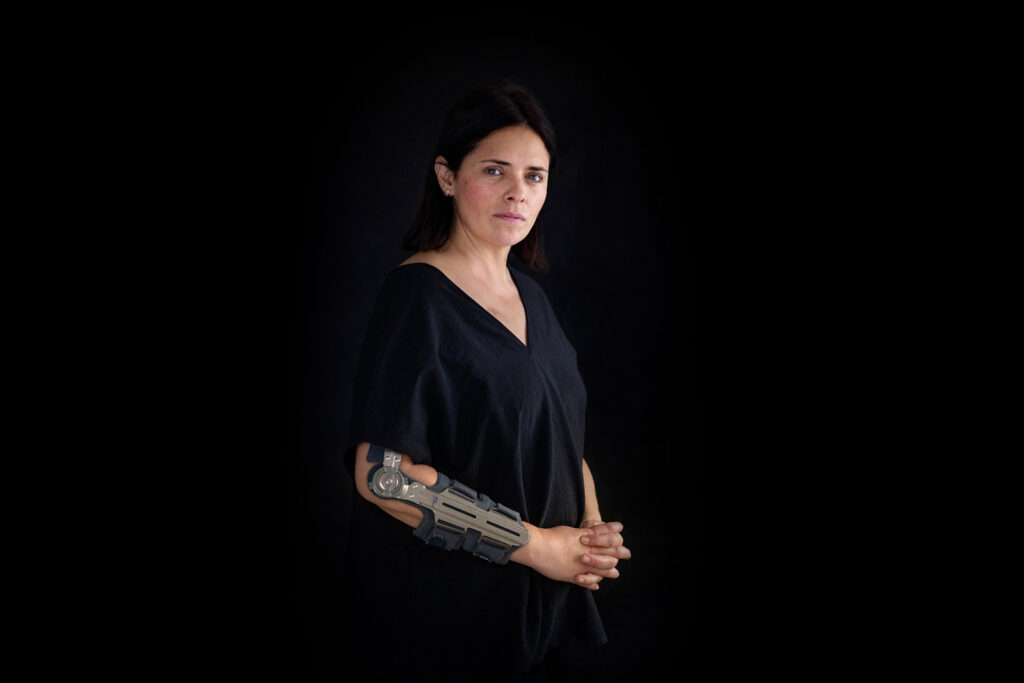
“My disease, congenital coagulopathy (coagulation factor VII deficiency), means that every time I give myself the slightest blow, I have internal hemorrhages in my joints that cause huge inflammations and terrible pain, much worse than toothache!”
Laura Garcia. Congenital coagulopathy. Factor VII deficiency.
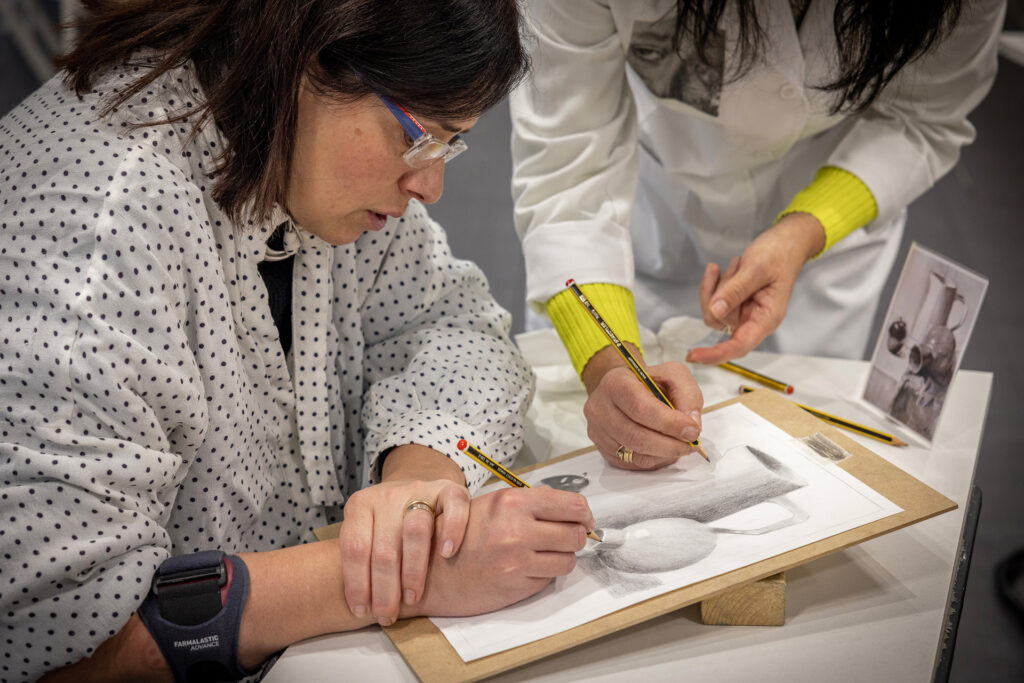
“I have arthropathy in my right elbow, so I write and draw quite badly, but the time I spend in class drawing I am focused on each stroke, my mind goes blank and I don’t think about the pain”.
Laura Garcia. Congenital coagulopathy. Factor VII deficiency.
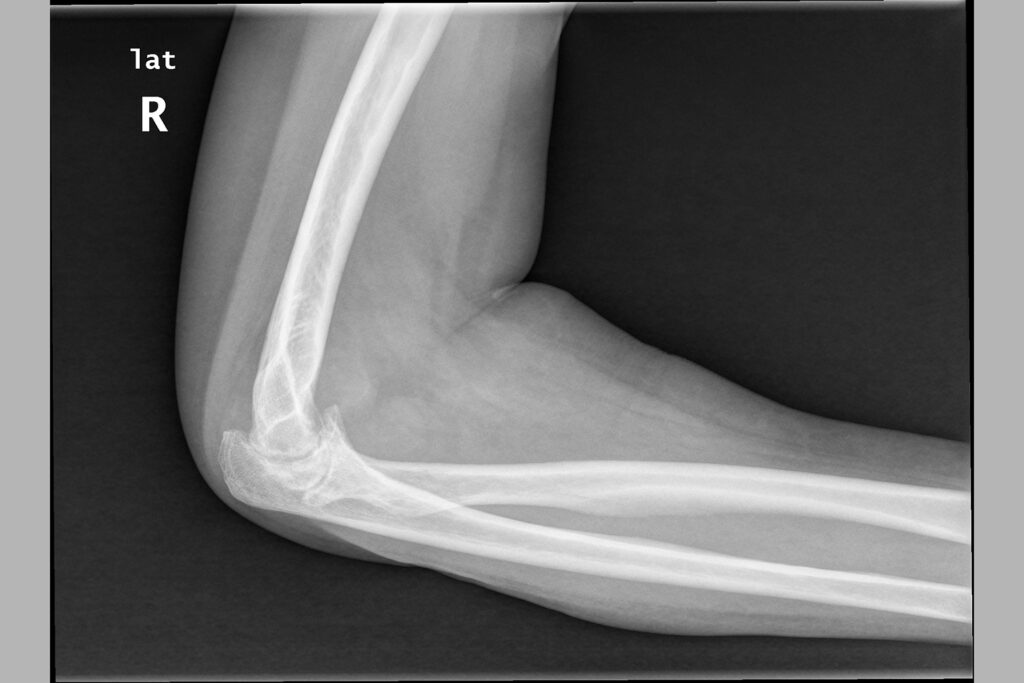
“It has limited my mobility a lot, I can no longer run, I limp frequently… When I was a child I was even insulted for limping and I had a lot of self-consciousness. I was told not to have children, because I could bleed to death. Today my daughter Claudia is 12 years old, she is healthy and happy, and I have been dancing flamenco for a decade.”
Laura Garcia. Congenital coagulopathy. Factor VII deficiency.
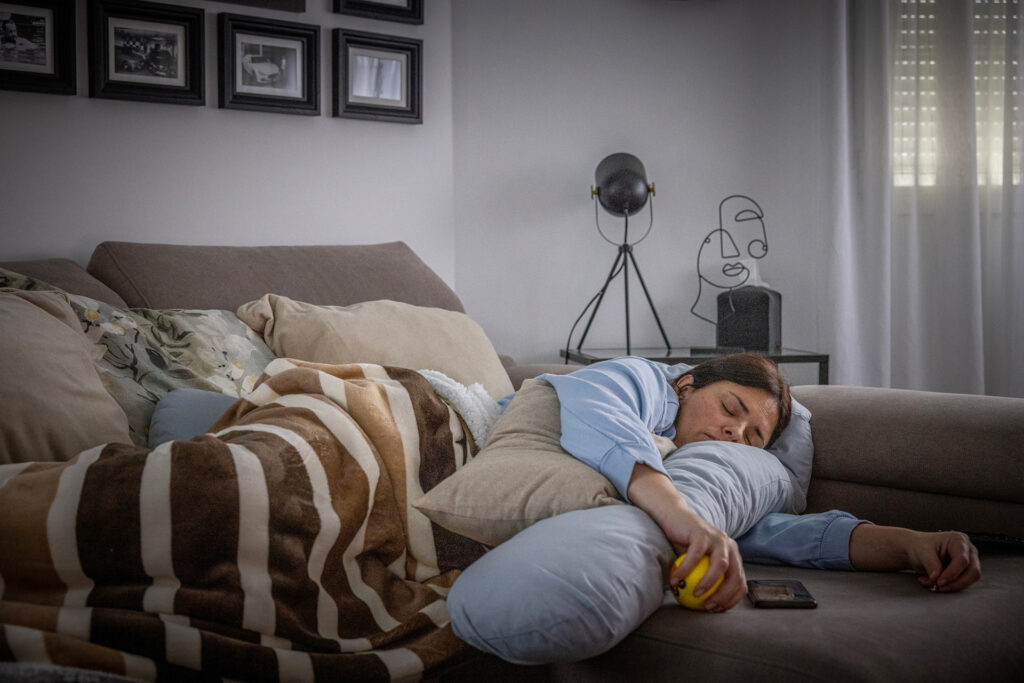
“When I feel bad, Ricardo, my husband, doesn’t let me get sadder or sink any lower. He always takes me out of places where I don’t have the strength to cheer me up, by taking me on a trip, going for a walk or making me laugh”.
Laura Garcia. Congenital coagulopathy. Factor VII deficiency.
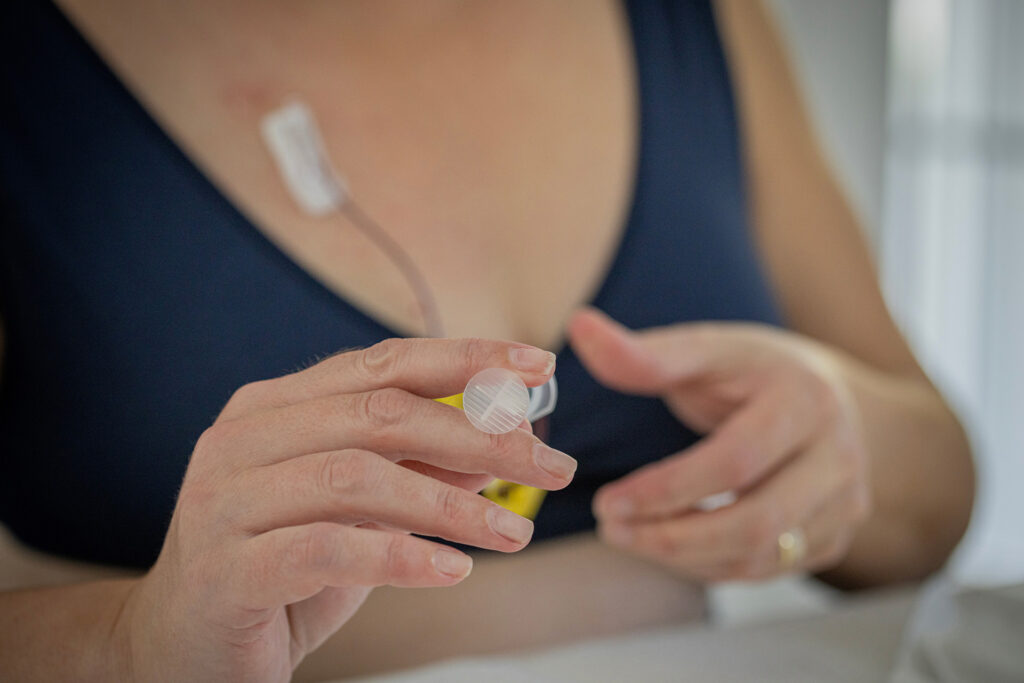
“I had to prick myself every four hours for fifteen days because of internal bleeding in my right elbow that would not be reabsorbed. Then I had to rest for fifteen days and start all over again, and so on for two years in a row.
There came a time when I could no longer inject myself, but I was afraid to go to the hospital, because they could no longer find veins to put the IV in. It was an ordeal. They had to look for them in my neck, between my toes… That is why the decision was made to place the reservoir”.
Laura Garcia. Congenital coagulopathy. Factor VII deficiency.
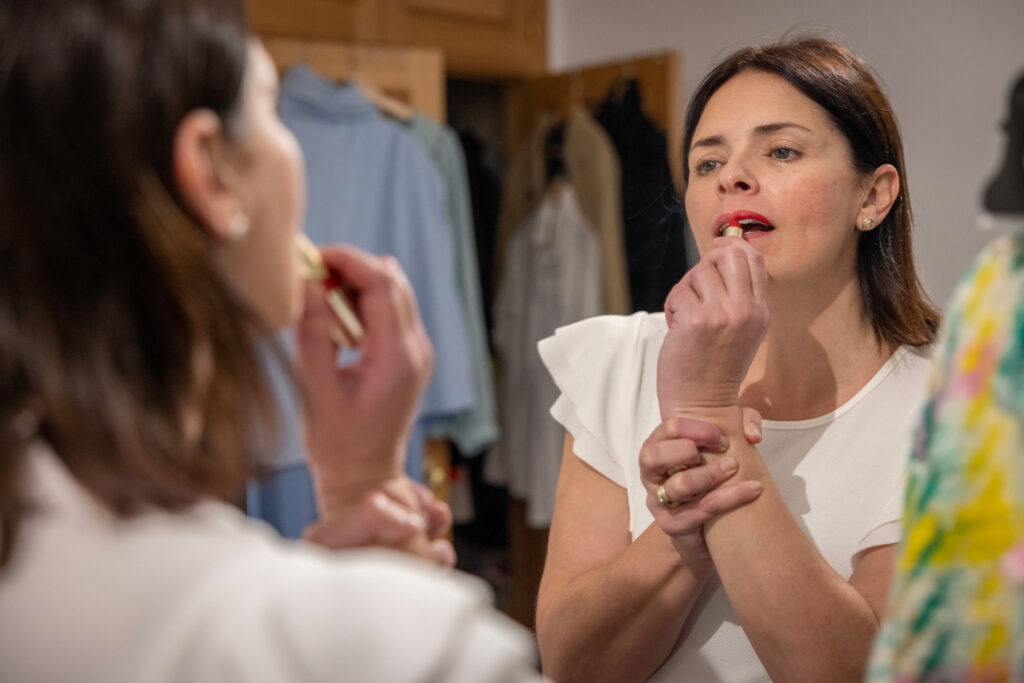
“In 2019, the first meeting of women carriers and women with congenital coagulopathies was held and I decided to go. Since that day I belong to the Women’s Commission that was created to give visibility to this disease, and that other women who suffer from it, know that they are not alone and support them as much as possible”.
Laura Garcia. Congenital coagulopathy. Factor VII deficiency.
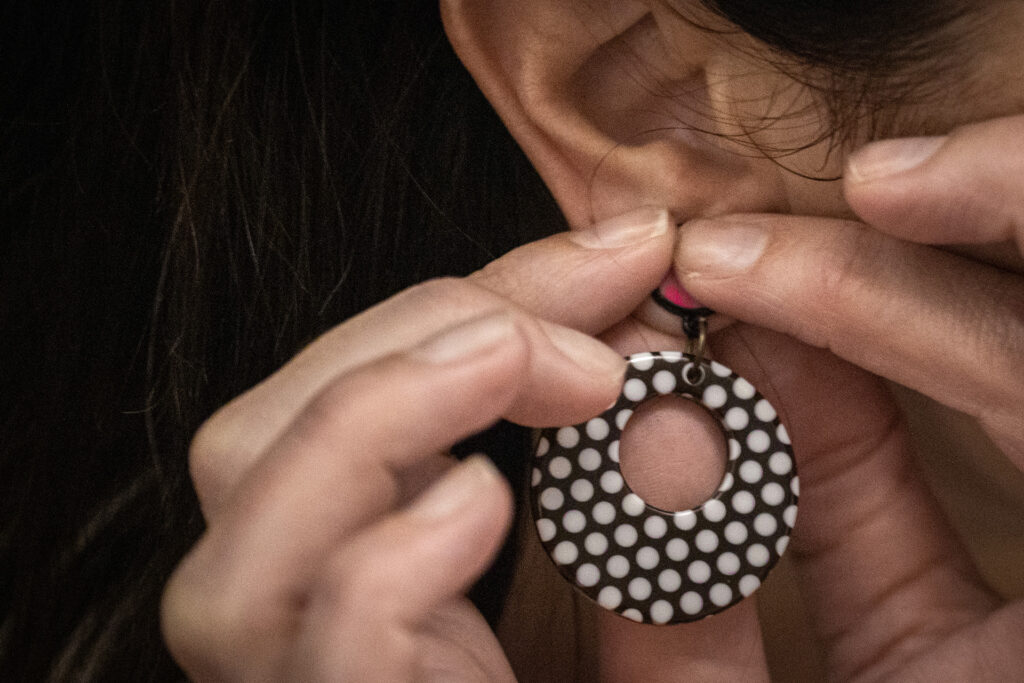
“I really enjoy dancing. If I had not had this arthropathy, it is possible that I would have dedicated myself to dancing professionally.”
Laura Garcia. Congenital coagulopathy. Factor VII deficiency.
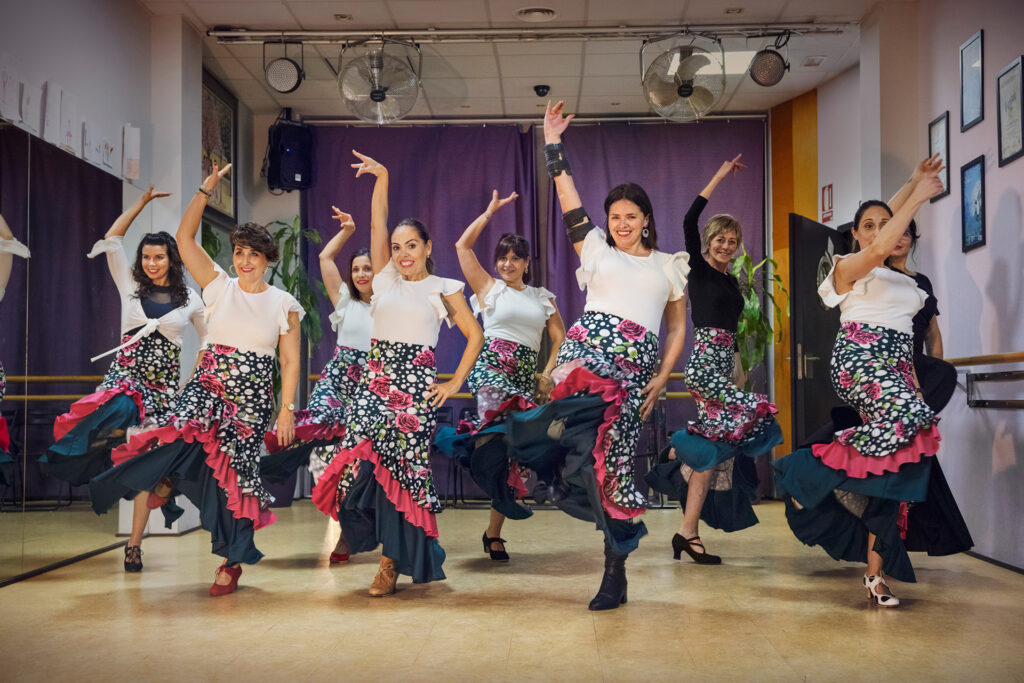
“Dancing is an escape route. Even though I have limitations and arthropathy in my elbow and both ankles, it is a release on an emotional level. Dancing helps me not to think.”
Laura Garcia. Congenital coagulopathy. Factor VII deficiency.
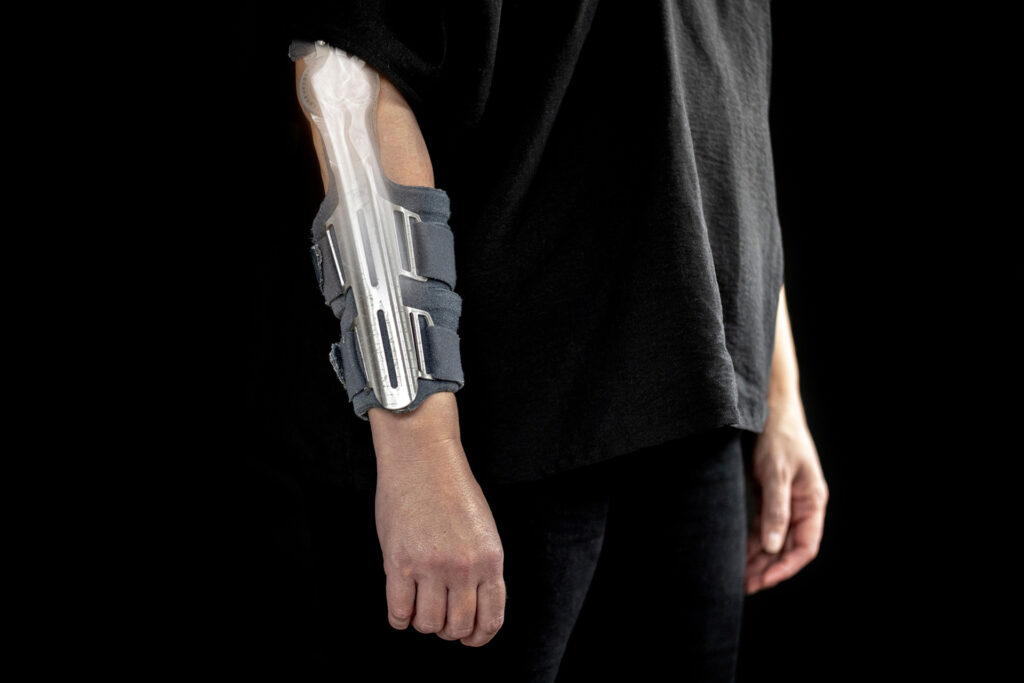
“I was advised against dancing because the next day, or for several days, I have a bad time and I have a lot of discomfort. But the time I am dancing, even if I am medicated with anti-inflammatories, painkillers or whatever, is a time of disconnection”.
Laura Garcia. Congenital coagulopathy. Factor VII deficiency.
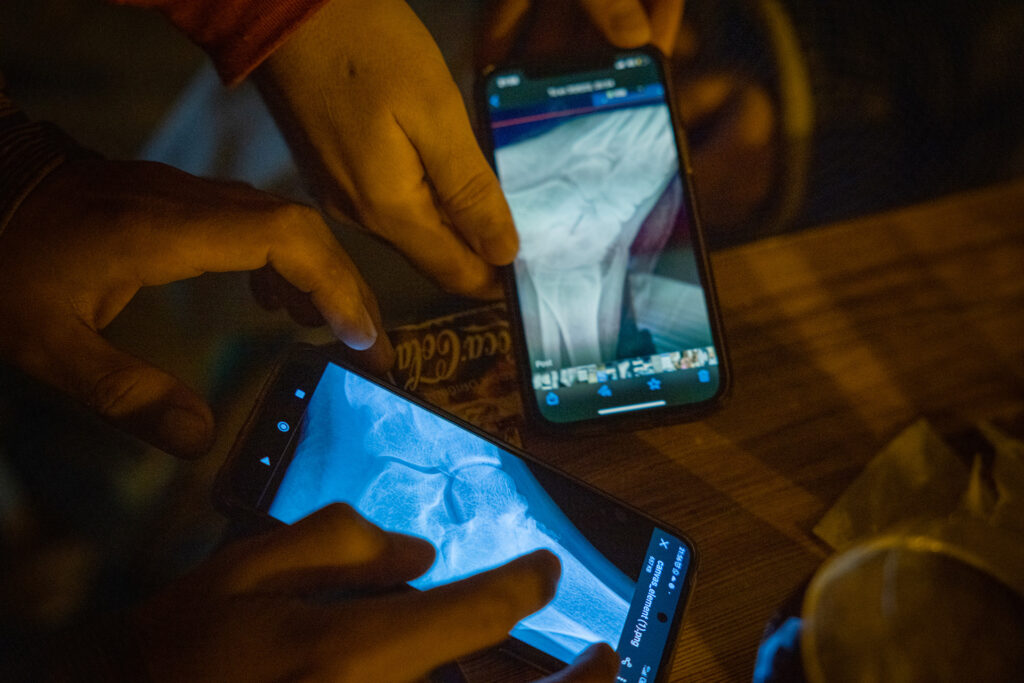
“I have had cuts and falls and nothing has happened to me. My coagulation is fine, the blood tests say so. I feel that I feel very well since I have been on this new treatment.
I stretch, take my medication, put cold on the area that hurts and keep going. To keep walking. I’ve always lived this way, it’s something I’ve had since birth, I’m used to having pain and it doesn’t affect me negatively.”
Raúl Martínez. Hemophilia A. Severe.

“Now I prick myself once a week, when before it was three times a week. I am limited by joints that I have bad from before and, on that, there is little to do, but at least I am not getting worse from a year and a half ago because I do not have any bleeding. My physical condition is much better and so is my quality of life”.
Raúl Martínez. Hemophilia A. Severe.
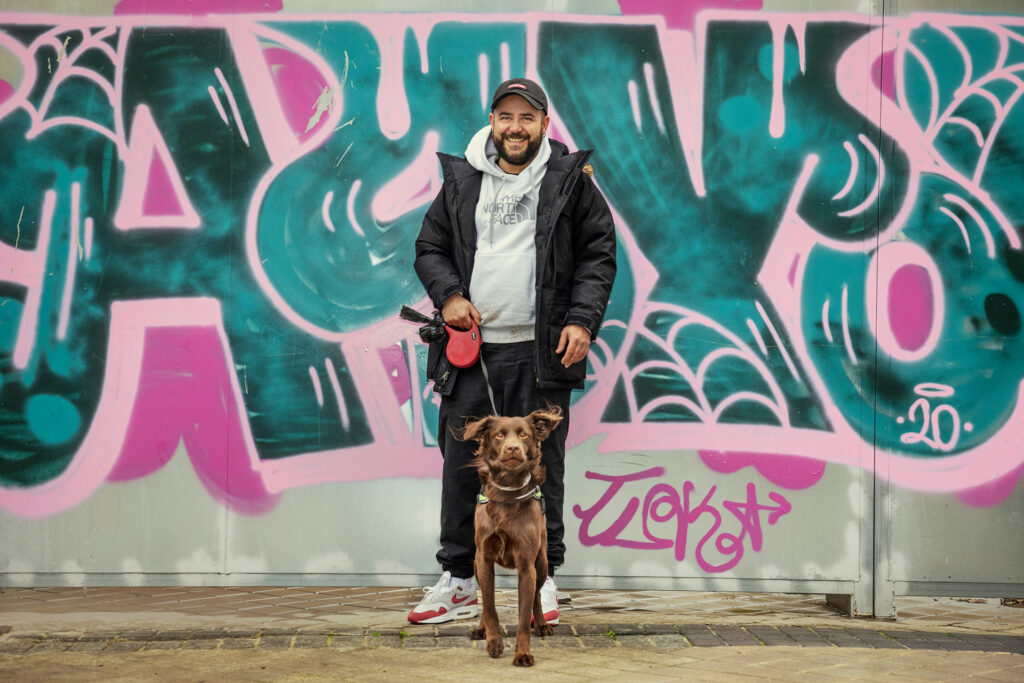
“I found Zar as a puppy, abandoned on a road with his mother, the same day I had just buried my dog in a pet cemetery. It was clearly a sign to adopt him. He keeps me a lot of company, I love him a lot, he’s everything to me.”
Raúl Martínez. Hemophilia A. Severe.
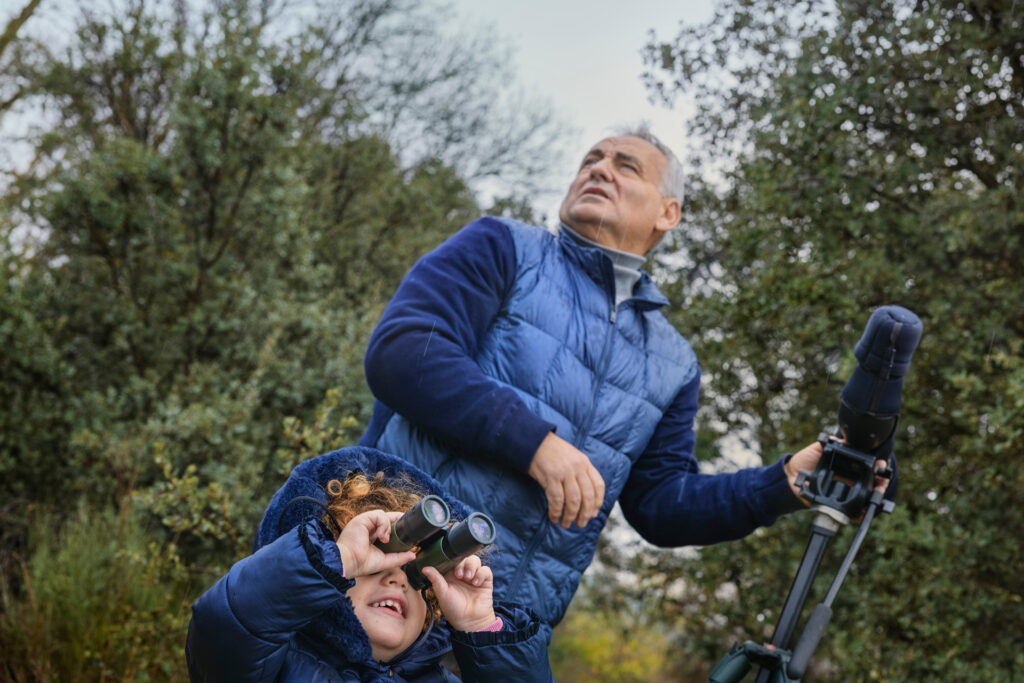
“I have always been passionate about animals, especially birds. I think it is because they fly, because they fly, they are free… they fly. I think I would have liked to fly like them. When I’m watching birds, it’s like the problems go away. I get away from everything. Everything stops.”
Julio Ramiro. Hemophilia A. Severe.
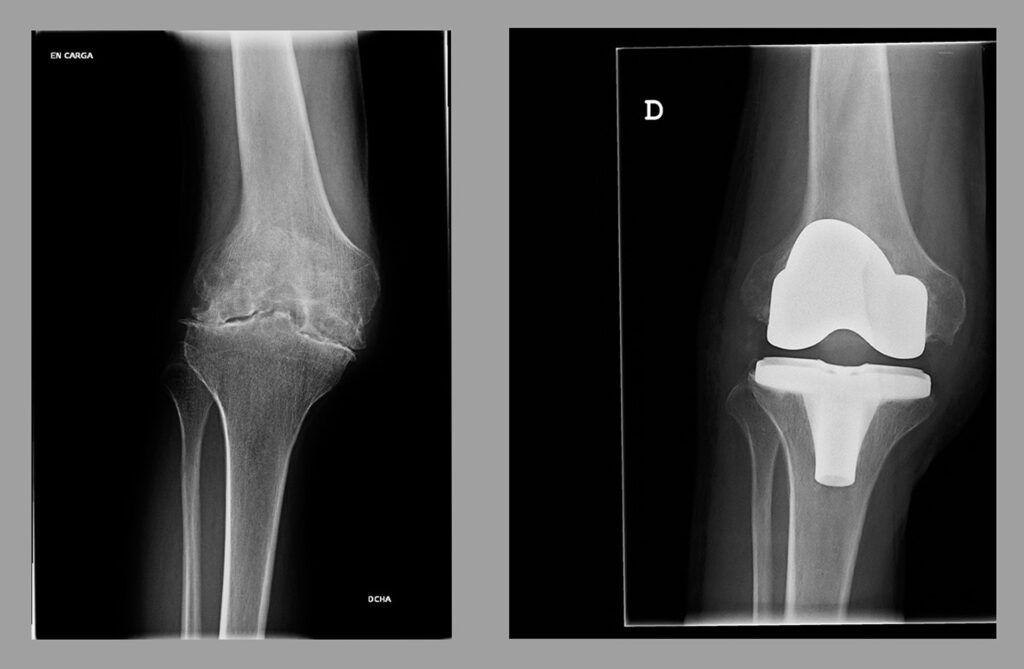
“When I was born, hemophilia turned my life into a winding road. As a child, everything was “you can’t do that”, constant hospital visits and almost daily punctures.
I wanted to be a veterinarian, but my disease forced me to choose a profession that could be practiced sitting in an office. I immediately became self-employed because it was going to be difficult to find work as an employee, due to constant absences and sick leave.
The pain became unbearable, not even morphine could relieve me. I spent almost two years in a wheelchair. Chronic pain, so intense and knowing that it will never end, is desperate and distressing. It affects every aspect of your life.
About six years ago, I entered a clinical trial of a new medication and my life has taken a wonderful unexpected turn. I now take my medication only once a month, injecting a very small amount subcutaneously… Hopefully this medication will soon be available to everyone.”
Julio Ramiro. Hemophilia A. Severe.
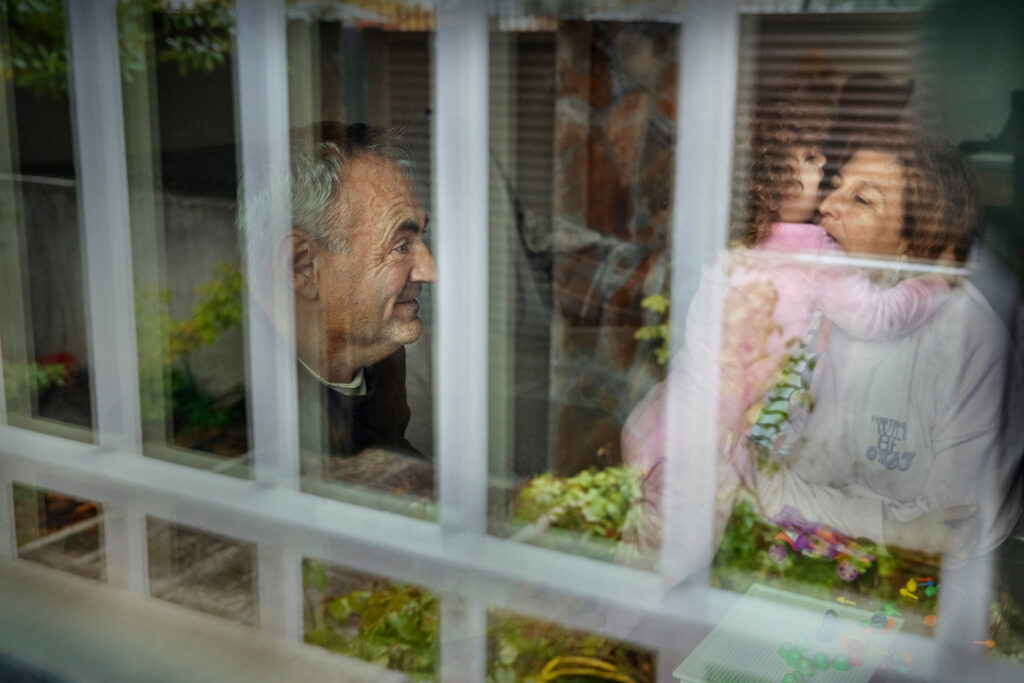
“Nuria, my partner, is a total and unconditional support. I have known Lydia since she was seven years old, so she is also very important. And Eva, the little one… I had never thought about having children. I told myself that I was going to be a dependent person, that how could I have children, that it was impossible”.
Julio Ramiro. Hemophilia A. Severe.
Hemo’ project materials’.
Photography and video
Ana Palacios
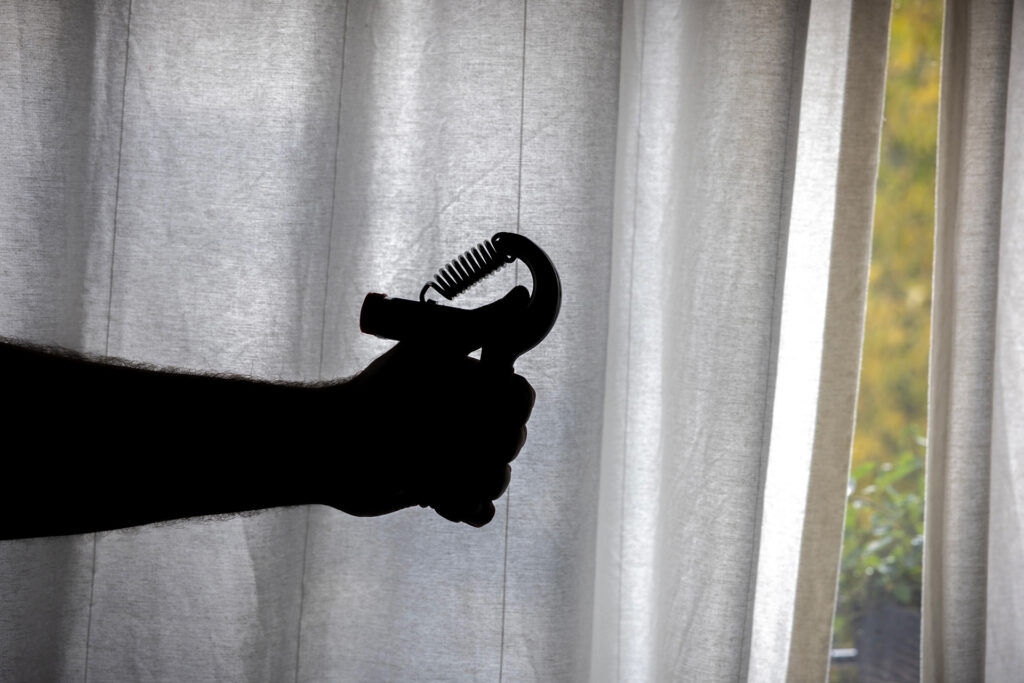
I was born and hemophilia was already with me. I don’t know any other reality, for me it is normal to go to the hospital frequently, to take medication almost every day and to have pain. Sometimes more and sometimes less, but I almost always have pain.
It conditions me in my daily life a lot, for example when I travel. I used to have to carry boxes and boxes of medication even if it was for a couple of days. I live in a constant state of alertness so as not to trip, fall, or bump myself because that means having to prick myself immediately and for several days in a row, wherever I am. It is a disease that reminds you every minute how valuable health is.
Francisco Batalla. Hemophilia A. Severe.
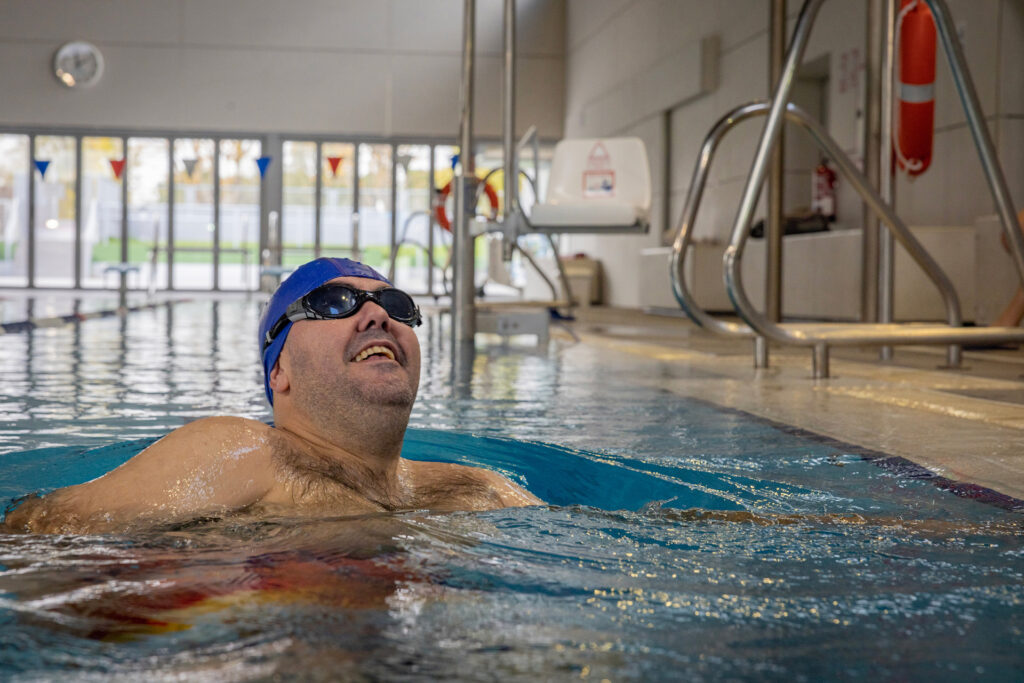
“The doctors always recommended swimming. It is a sport that is not aggressive for the joints. I’ve been growing and my joints are worse, so now I like being in the pool even more. It allows me to do many movements that I can’t do outside and it makes me feel good.
I would like to enter a clinical trial study. I have been close but, in the end, it has not been possible due to incompatibility with other medication. I know that it would be a qualitative leap for me to feel better and not have to be constantly on medication”.
Francisco Batalla. Hemophilia A. Severe.
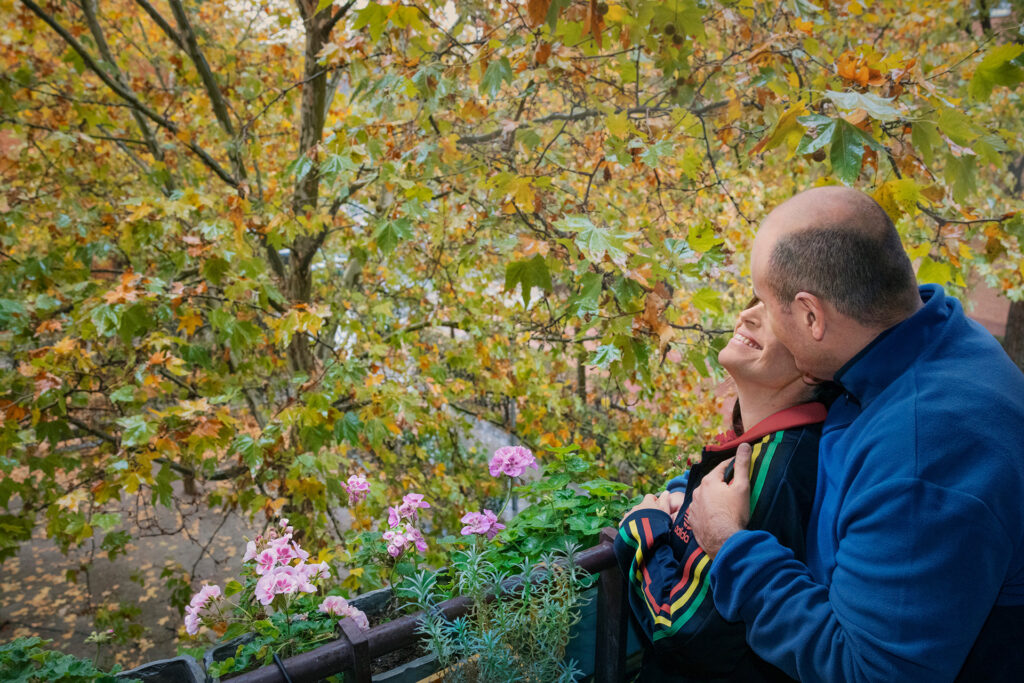
“From the beginning I told Mamen about all my medical problems. I loved that it didn’t affect our relationship at all. She always helps me keep going in my lowest moments. We have a normal life together and we like to travel a lot. Despite my limitations, we don’t give it up. We look for ways to make it possible.”
Francisco Batalla. Hemophilia A. Severe.
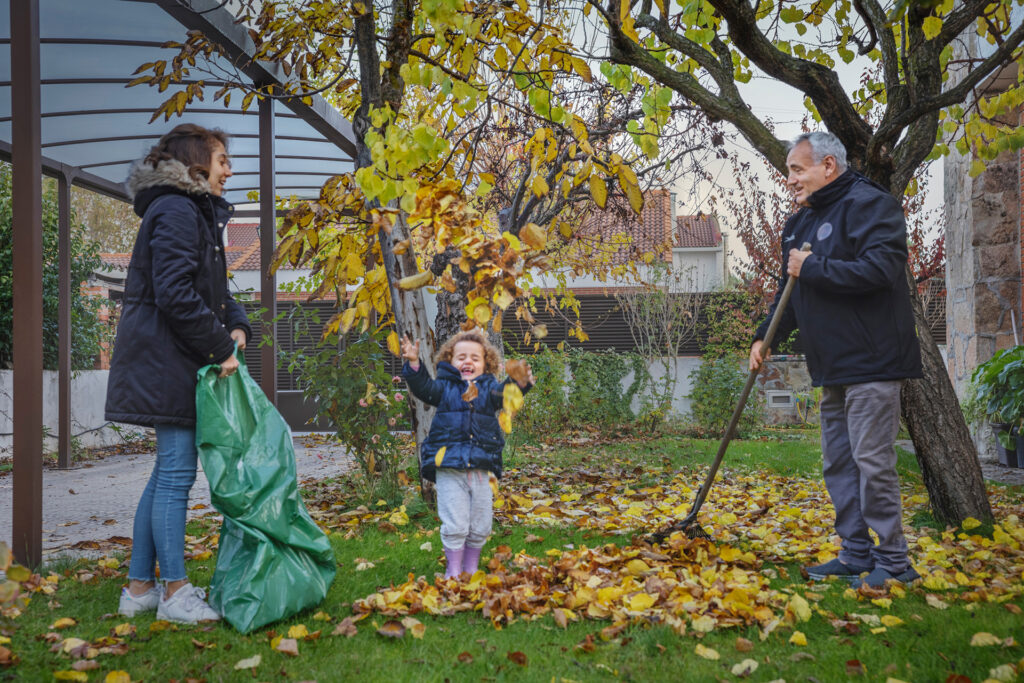
“Over time there has been a spectacular evolution. With just one shot a month you are already covered, I no longer have those bruises I used to have all over my body. I no longer have the fear that I’m going to bleed, because I no longer bleed. It is incredible, it is a new life. The joint damage I have is there, but I know it is not going to get worse. That gives you the peace of mind of being able to move, of being able to do things, of not having that fear. I get a subcutaneous injection once a month and with that you are ready. The evolution has been tremendous.”
Julio Ramiro. Hemophilia A. Severe.
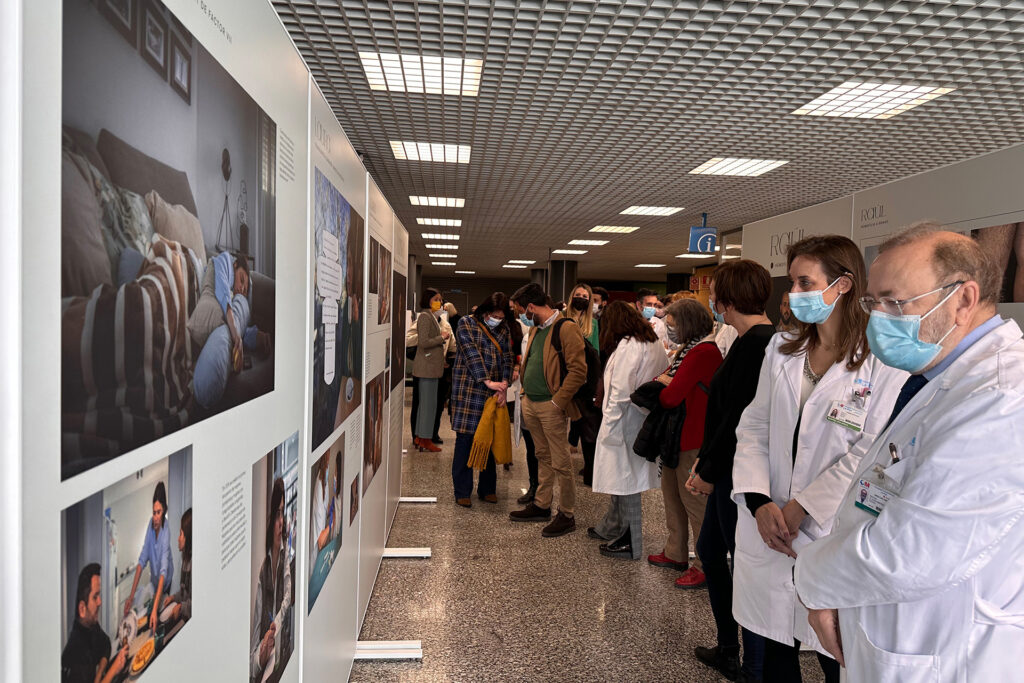
If you have made it this far and you enjoyed the “Hemo”, you should know there is an exhibition available of this project.
Exhibit designed by Ana Deguez @anadeguez
Production Assitantant: María Nuñez @mariachinasky
Please feel free to contact me@ana-palacios.com for further details.
Hemo
Hospital Río Carrión de Palencia
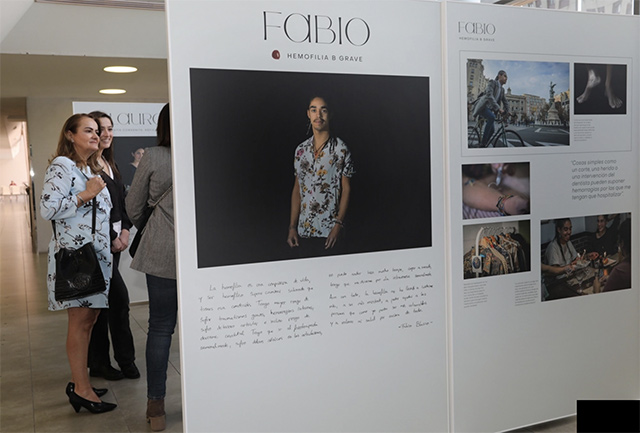
Hemo
Hospital Universitario Virgen del Rocío. Sevilla
Hemo
Hospital Álvaro Cunqueiro. Vigo.